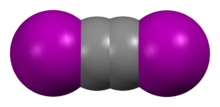Chemistry:Diiodoacetylene
From HandWiki

| |
| Names | |
|---|---|
| Preferred IUPAC name
Diiodoethyne | |
| Identifiers | |
3D model (JSmol)
|
|
| ChemSpider | |
PubChem CID
|
|
CompTox Dashboard (EPA)
|
|
| |
| |
| Properties | |
| C2I2 | |
| Appearance | white solid |
| Density | 3.43 g/cm3 |
Except where otherwise noted, data are given for materials in their standard state (at 25 °C [77 °F], 100 kPa). | |
| Infobox references | |
Diiodoacetylene is the organoiodine compound with the formula C2I2. It is a white, volatile solid that dissolves in organic solvents. It is prepared by iodination of trimethylsilylacetylene.[1] Although samples explode above 80 °C, diiodoacetylene is the most readily handled of the dihaloacetylenes. Dichloroacetylene, for example, is more volatile and more explosive.[2] As confirmed by X-ray crystallography, diiodoacetylene is linear.[3] It is however a shock, heat and friction sensitive compound. Like other haloalkynes, diiodoacetylene is a strong halogen bond donor.[4]
References
- ↑ Perkins, Catherine; Libri, Stefano; Adams, Harry; Brammer, Lee (2012). "Diiodoacetylene: Compact, Strong Ditopic Halogen Bond Donor". CrystEngComm 14 (9): 3033. doi:10.1039/c2ce00029f.
- ↑ Henning Hopf; Bernhard Witulski (1995). "Functionalized Acetylenes in Organic Synthesis ‐ The Case of the 1‐Cyano‐ and the 1‐Halogenoacetylenes". in Stang, Peter J.. Modern Acetylene Chemistry. Weinheim: VCH. pp. 33–66. doi:10.1002/9783527615278.ch02. ISBN 9783527615261.
- ↑ Dunitz, J. D.; Gehrer, H.; Britton, D. (1972). "The Crystal Structure of Diiodacetylene: An Example of Pseudosymmetry". Acta Crystallographica Section B: Structural Crystallography and Crystal Chemistry 28 (7): 1989–1994. doi:10.1107/S0567740872005400..
- ↑ Cavallo, G.; Metrangolo, P.; Milani, R.; Pilati, T.; Priimagi, A.; Resnati, G.; Terraneo, G. (2016). "The Halogen Bond". Chem. Rev. 116 (4): 2478–2601. doi:10.1021/acs.chemrev.5b00484. PMID 26812185.
 |

